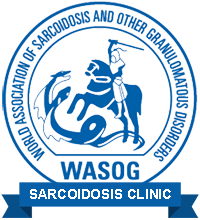Diagnostic approach for cardiac involvement in sarcoidosis
Keywords:
Cardiac sarcoidosis, Cardiovascular magnetic resonance, SarcoidosisAbstract
Aims: Cardiac sarcoidosis (CS) is a potentially life-threatening condition. Early detection of CS is therefore important. The aim of this study was to eludicate the usefulness of different investigations in a subgroup of patients with sarcoidosis regarded as having an increased risk for cardiac involvement. Methods: 42 sarcoidosis patients, who had an abnormal resting electrocardiogram (ECG) and/or symptoms indicating possible cardiac involvement (i.e. palpitations, pre-syncope or syncope), were included in the study. They were identified in a consecutive manner among patients followed-up at outpatient clinics for respiratory disorders. Holter monitoring, exercise test, transthoracic echocardiogram (TTE), cardiovascular magnetic resonance (CMR) and analysis of N-terminal pro B-type natriuretic peptide (NT-pro-BNP) in serum were performed. Note, that the role of FDG-PET was not investigated in this study. Results: In the group with a pathologic ECG 11/25 (44%) were ultimately diagnosed with CS (all with pathologic CMR). However, in the group with only symptoms but a normal ECG just 1/17 got the diagnosis CS (p<0.05). This patient had a pathologic Holter monitoring. The risk for CS was increased if serum NT-pro-BNP was elevated (i.e. NT-pro-BNP>125 ng/L), sensitivity 78% (p<0.05), specificity 67%. By adding a pathologic ECG to an elevated NT-pro-BNP increased specificity to 93% and sensitivity remained at 78%. Conclusion: Our findings indicate that CMR should be performed at an early stage in sarcoidosis patients with an abnormal resting ECG. Holter monitoring and elevated levels of NT-pro-BNP may enhance the diagnostic accuracy whereas exercise testing and TTE in this study had less impact on the identification of CS.
Downloads
Published
Issue
Section
License
This is an Open Access article distributed under the terms of the Creative Commons Attribution License (https://creativecommons.org/licenses/by-nc/4.0) which permits unrestricted use, distribution, and reproduction in any medium, provided the original work is properly cited.
Transfer of Copyright and Permission to Reproduce Parts of Published Papers.
Authors retain the copyright for their published work. No formal permission will be required to reproduce parts (tables or illustrations) of published papers, provided the source is quoted appropriately and reproduction has no commercial intent. Reproductions with commercial intent will require written permission and payment of royalties.

This work is licensed under a Creative Commons Attribution-NonCommercial 4.0 International License.








